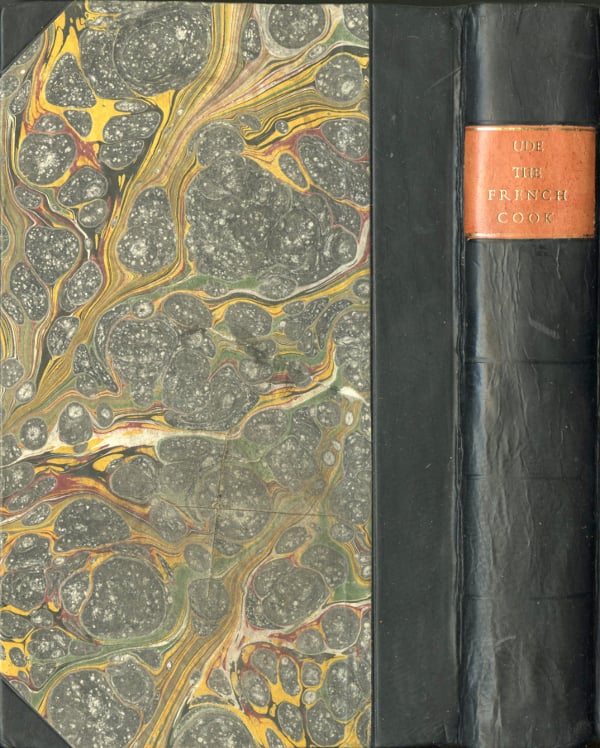Stuffed (1)
By:
October 10, 2014
One in a new series of posts by Tom Nealon, author of the highly popular 2010–2012 HiLobrow series DE CONDIMENTIS. The posts in the STUFFED series are inspired by Nealon’s collection of rare cookbooks, which he sells — among other things — via Pazzo Books. His rare cookbook catalog is here.
STUFFED SERIES: THE MAGAZINE OF TASTE | AUGURIES AND PIGNOSTICATIONS | THE CATSUP WAR | CAVEAT CONDIMENTOR | CURRIE CONDIMENTO | POTATO CHIPS AND DEMOCRACY | PIE SHAPES | WHEY AND WHEY NOT | PINK LEMONADE | EUREKA! MICROWAVES | CULINARY ILLUSIONS | AD SALSA PER ASPERA | THE WAR ON MOLE | ALMONDS: NO JOY | GARNISHED | REVUE DES MENUS | REVUE DES MENUS (DEUX) | WORCESTERSHIRE SAUCE | THE THICKENING | TRUMPED | CHILES EN MOVIMIENTO | THE GREAT EATER OF KENT | GETTING MEDIEVAL WITH CHEF WATSON | KETCHUP & DIJON | TRY THE SCROD | MOCK VENISON | THE ROMANCE OF BUTCHERY | I CAN HAZ YOUR TACOS | STUFFED TURKEY | BREAKING GINGERBREAD | WHO ATE WHO? | LAYING IT ON THICK | MAYO MIXTURES | MUSICAL TASTE | ELECTRIFIED BREADCRUMBS | DANCE DANCE REVOLUTION | THE ISLAND OF LOST CONDIMENTS | FLASH THE HASH | BRUNSWICK STEW: B.S. | FLASH THE HASH, pt. 2 | THE ARK OF THE CONDIMENT | SQUEEZED OUT | SOUP v. SANDWICH | UNNATURAL SELECTION | HI YO, COLLOIDAL SILVER | PROTEIN IN MOTION | GOOD RIDDANCE TO RESTAURANTS.

After Napoleon was defeated at Waterloo and Louis XVIII restored as king (of a constitutional monarchy), the trend of famous French chefs fleeing to England that had begun with Vincent La Chapelle (author of The Modern Cook [London, 1733]) and had picked up pace after Louis XVI met the guillotine, accelerated dramatically.
Along with their silverware, sous-chefs, and self-regard, these French chefs exported sauces that had been perfected in the 150-some years since La Varenne’s Cuisinier François was published in 1651. Beleaguered English chefs now had to contend with an arsenal of sauces as long as Napoleon’s, um, code: Sauce Allemande, Espagnole, velouté, Italian, sharp, hachée, maitre d’Hotel, beurre, béchamelle, Genoese, Bearnaise, on and on. The English had won the war against Napoleon but were in jeopardy of losing the war with his cooks. It got so bad that Louis XVI’s old chef, Louis Eustache Ude, said (in his much reprinted English cookbook first published in 1813) “I dare affirm, that Cookery in England, when well done [i.e.. done French style with English resources], is superior to that of any country in the world.”
English cooks were in a spot, and they weren’t going to be able to boil themselves out of this one.

The detail-oriented English inventor and cook William Kitchiner, whose cookbook included extensive instructions and even a drinking song, and who was as renowned for doing his own prep work and locking latecomers out of his dinner parties as he was for his cooking, prepared a response. In Apicius Redivivus, or the Cook’s Oracle (London, 1817), Kitchiner described a tabletop box of condiments he cunningly called The Magazine of Taste. It was filled with 8-, 4-, and 2-ounce bottles of:
- Pickles
- Brandy
- Curaçao
- Syrup
- Salad sauce
- Pudding catsup
- Sauce superlative
- Walnut pickle
- Mushroom catsup
- Vinegar
- Oil
- Mustard
- Salt
- Curry powder
- Soy
- Lemon juice
- Essence of anchovy
- Pepper
- Cayenne
- Soup-herb powder
- Ragout powder
- Pea powder
- Zest
- Essence of celery
- Sweet herbs
- Lemon-peel
- Eshallot wine
- Powdered mint

Underneath all this: A drawer containing 1-ounce bottles, weights and scales, a glass measure, corkscrew, nutmeg-grater, tea and tablespoons, knife and fork, a steel, and a mortar.
A little background on the French invasion force Kitchiner was attempting to single-handedly repel: French cookery since the mid-17th century had focused on becoming modular: creating pre-made ingredients that could be added to dishes to increase their complexity without overwhelming the cook with the need to recreate the wheel with every meal. Hams and partridges and vegetables were cooked down to a thick paste called coulis that was secreted in earthen jars and added to sauces, bouillons, stuffings. Force meats were made and put aside to be used in recipes, and herb mixtures and bundles (bouquet garni) were kept handy. The entire French system had evolved to mitigate complexity, to impose order and structure upon the chaotic process of cooking and eating. So this thing that Kitchiner saw coming at him from across the English Channel was an imposing Chimera: pieced together as necessity dictated, but fully functional and dangerous.
Despite his obvious disadvantages, Kitchiner had one major advantage: He knew the British palate and thus the British character. He knew that you led with pickles, that brandy was the only logical riposte to red wine, and that while the French were trying to figure out salad sauce (mustard, horseradish, spices, with boiling vinegar, aged two weeks) he could put that pudding catsup (brandy, sherry, mace and cloves steeped for two weeks with fern syrup and served with melted butter) to work counteracting their sauce velouté. Most of all he knew that if he could just blunt their initial charge, most of these cooks would wander back across the Channel and try to find work in the kitchen of some ex-Marquis. Working furiously, Kitchiner invented one of the first “daughter” condiments, that is, a prepared condiment with a prepared condiment as an ingredient. His sauce superlative [port wine, mushroom catsup — itself mushrooms slow melted in salt over a period of days with a few added spices — vinegar, crystallized lemon, anchovies, savory, thyme, lemon-peel, shallots, allspice, pepper, ginger, mace, cayenne, and celery seed] was the English condiment version of a modern French sauce. Whether the taste buds of his countrymen were won over, bewildered, or put in a burlap sack to be beaten to death and thrown in the Thames, we don’t know, but English cuisine was saved from amelioration.
In the final estimation. French food was not really to the taste of most English people. Napoleon was not too far wrong in his famous jibe: England was a nation of shopkeepers, and to a shopkeeper, a box of handy interchangeable flavors is to be much preferred over a fancy sauce. While the English might like their suits and hats bespoke, they prefer their food off the rack, dressed up with some clever accessories. As Kitchiner said in the “Advice to Cooks” section of The Cook’s Oracle, “The Englishman boasts of his beef, the Frenchman dresses his favorite frog and soup.” Of course he was being a dick, but given a choice between essence of anchovy and soup-herb powder (just what it sounds like) on the one hand and sauce espagnole and foie gras ragout on the other, the bulk of the British people were always going to lean towards the former. They just needed William Kitchiner to park them at the table and make them pick them out of a box.
STUFFED SERIES: THE MAGAZINE OF TASTE | AUGURIES AND PIGNOSTICATIONS | THE CATSUP WAR | CAVEAT CONDIMENTOR | CURRIE CONDIMENTO | POTATO CHIPS AND DEMOCRACY | PIE SHAPES | WHEY AND WHEY NOT | PINK LEMONADE | EUREKA! MICROWAVES | CULINARY ILLUSIONS | AD SALSA PER ASPERA | THE WAR ON MOLE | ALMONDS: NO JOY | GARNISHED | REVUE DES MENUS | REVUE DES MENUS (DEUX) | WORCESTERSHIRE SAUCE | THE THICKENING | TRUMPED | CHILES EN MOVIMIENTO | THE GREAT EATER OF KENT | GETTING MEDIEVAL WITH CHEF WATSON | KETCHUP & DIJON | TRY THE SCROD | MOCK VENISON | THE ROMANCE OF BUTCHERY | I CAN HAZ YOUR TACOS | STUFFED TURKEY | BREAKING GINGERBREAD | WHO ATE WHO? | LAYING IT ON THICK | MAYO MIXTURES | MUSICAL TASTE | ELECTRIFIED BREADCRUMBS | DANCE DANCE REVOLUTION | THE ISLAND OF LOST CONDIMENTS | FLASH THE HASH | BRUNSWICK STEW: B.S. | FLASH THE HASH, pt. 2 | THE ARK OF THE CONDIMENT | SQUEEZED OUT | SOUP v. SANDWICH | UNNATURAL SELECTION | HI YO, COLLOIDAL SILVER | PROTEIN IN MOTION | GOOD RIDDANCE TO RESTAURANTS.
MORE POSTS BY TOM NEALON: Salsa Mahonesa and the Seven Years War, Golden Apples, Crimson Stew, Diagram of Condiments vs. Sauces, etc., and his De Condimentis series (Fish Sauce | Hot Sauce | Vinegar | Drunken Vinegar | Balsamic Vinegar | Food History | Barbecue Sauce | Butter | Mustard | Sour Cream | Maple Syrup | Salad Dressing | Gravy) — are among the most popular we’ve ever published here at HILOBROW.
